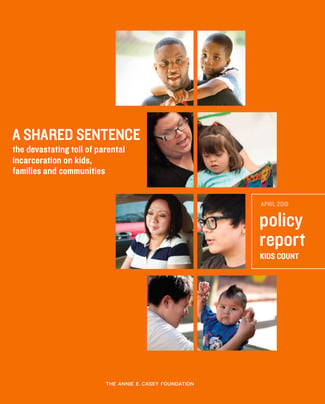More than 5 million of today’s children have had an incarcerated parent with the vast majority of those parents being fathers.
 In light of this depressing statistic, a recent report from the Annie E. Casey Foundation provides recommendations for policies and practices that “put the needs of children and incarcerated parents first.”
In light of this depressing statistic, a recent report from the Annie E. Casey Foundation provides recommendations for policies and practices that “put the needs of children and incarcerated parents first.”
These recommendations are sorely needed because of the devastating effects of incarceration on families and communities. These effects (quoted directly from the report) include:
- An added financial burden. Incarceration is a destabilizer, pushing families teetering on the edge into financial disaster. Losing a parent who is the breadwinner, often for a prolonged period, leaves families scrambling to cover basic needs along with legal and other court fees. When fathers are incarcerated, family income can drop by an average of 22 percent.
- A blow to child and family health and well-being. Having a parent incarcerated is a stressful, traumatic experience of the same magnitude as abuse, domestic violence and divorce, with a potentially lasting negative impact on a child’s well-being. These young children lose a parent’s support during their critical early years, a time when their families and communities should be laying the foundation for healthy development and success.
- New obstacles for families when parents return. Time behind bars limits parents’ options for steady employment that pays well enough to support their kids. Returning parents struggle to find or maintain safe, stable housing for their families or, if they live apart, just for themselves.
- A drain on community resources and opportunity. The communities where children live don’t go unscathed. Many are mired in poverty and contend with crime, poor quality housing, low-performing schools, and a dearth of resources that further prevent families from creating a safe and nurturing home environment.
The report includes the following recommendations for policies and practices (again, quoted directly from the report):
- Ensure children are supported while parents are incarcerated and after they return. Children need permanent family connections and stability to do well, and their families need the financial and emotional wherewithal to support their well-being. Providing mental health and counseling programs to family members who step up as caregivers during incarceration can help children withstand the repercussions of this disruption in their lives.
- Connect parents who have returned to the community with pathways to employment. Without education, training, and work experience, parents who have been incarcerated can’t compete for today’s family-supporting jobs. Providing sector-specific education and training—starting in prison—for jobs in high-demand industries such as information technology can help parents develop the skills necessary to resume their role as providers, while reducing their likelihood of returning to prison.
- Strengthen communities, particularly those disproportionately affected by incarceration and reentry, to promote family stability and opportunity. The communities where children reside can make or break a family’s stability. Increasing communities’ access to opportunity and strengthening community-based organizations and programs can help entire neighborhoods—and, therefore, the families living in them—minimize the economic and social effects of incarceration.
The good news is National Fatherhood Initiative® (NFI) has programs and resources that can and have already helped corrections facilities and community organizations act on these recommendations.
- Indeed, NFI’s InsideOut Dad® program is mentioned in the report as an example of how corrections facilities and community organizations can act on the first recommendation by providing counseling and parenting education before and after incarcerated parents’ release.
- Many reentry organizations and programs that act on the second and third recommendations use NFI’s 24/7 Dad® program to educate fathers.
- Some states, such as Kentucky, have created integrated pre- and post-release systems that provide seamless reentry services and education for fathers using NFI’s programs.
- Many corrections facilities and community organizations integrate NFI’s other resources for incarcerated fathers—such as the self-paced InsideOut Dad® Guide to Family Ties and Out of the Ashes DVD with Discussion Guide—into NFI’s programs or for use when offering a fatherhood program is not feasible.
I encourage you to download the report for details on the effects of incarceration and the recommendations.
I also encourage you to see how NFI’s programs and resources can help you help the more than 5 million children affected by a parent’s incarceration.
For more information on the effects of incarceration on children and how NFI can help you be part of the solution, review and share this handy infographic.
Want to learn how you can get training to help incarcerated fathers connect to their children? Find details about InsideOut Dad® Webinar Training happening in June.
What are you doing to help children affected by their parent’s incarceration?
Are you making use of all NFI offers that helps incarcerated fathers to be the best dads they can be?
Are you a dad looking for help? Please visit our Fatherhood Program Locator™ and enter your city and state on the map to find programs and resources in your community.
 In light of this depressing statistic, a recent report from the Annie E. Casey Foundation provides recommendations for policies and practices that “put the needs of children and incarcerated parents first.”
In light of this depressing statistic, a recent report from the Annie E. Casey Foundation provides recommendations for policies and practices that “put the needs of children and incarcerated parents first.”